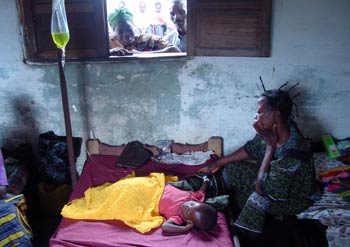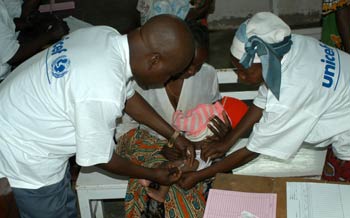 |
Sari Kovats describes research and policy priorities needed to address links between climate change and health in the Least Developed Countries. |
| She explains how little climate change has been incorporated into health policy and planning in these countries. The focus is on immediate health threats rather than the environmental determinants of ill health, and capacity to address the health impacts of climate change is low. The need for evidence-based approaches and interagency collaboration on policy and planning is stressed. | |
| The author is a lecturer in environmental epidemiology and an expert on the assessment of current and potential climate impacts on human population health. She works at the London School of Hygiene and Tropical Medicine in the United Kingdom. | |
Increasingly, health is used as a justification for taking action on climate change. The impacts of climate change on health are a prominent feature in Intergovernmental Panel on Climate Change (IPCC) reports, as well as in media coverage and political speeches. IPCC authors working on the Fourth Assessment Report, however, found very little published literature from low-income countries on climate and health issues, particularly African countries. Health is also not well represented in the international policy agreements that address climate change, such as the United Nations Framework Convention on Climate Change. Practitioners have now begun to address how to integrate climate change into development planning, but very little work has been undertaken to address the specifics of incorporating climate change into health policy.
The long-term impacts of climate change may be severe. Climate warming - and consequently water stress, disaster risk and food insecurity - is likely to affect the achievement of the Millennium Development Goals in 2015. Many countries in sub-Saharan Africa are not on track to meet these Goals and have very little capacity to address environmental risks and control infectious disease.
Least Developed Country challenges
Awareness of the potential impact of climate change on human health is generally low within health sectors in the Least Developed Countries (LDCs), even in countries like Bangladesh where levels of climate change awareness across the environmental sectors and in civil society at large is relatively high. Very few national or local assessments of the impacts of climate change on key health determinants, such as food security, access to water and flood risks, have been undertaken. Such assessments would be of great value to health decision makers.
Health policy focuses on trying to address clear and urgent disease problems. Time horizons tend to be short-term rather than long-term. Both decision making and research are undertaken in a compartmentalized way. Prevention activities such as public health and health protection are not given the attention they deserve. Environmental health issues are often a low priority even within prevention activities, and yet these concerns - water and sanitation, disaster preparedness, flood preparedness, housing and so on - are key for climate change. The problems of getting the health sector engaged in environmental problems should not be underestimated, let alone complex issues such as climate change.
Capacity in the LDCs
The LDCs already experience high burdens of climate-sensitive diseases and their capacity to address the health impacts of climate change is low. There is some evidence that climate change is already affecting health in the LDCs. Many people feel that changes in disease patterns can be attributed to observed climatic changes. It is clear, however, that LDCs currently have little capacity to detect changes in disease transmission and then to attribute these to anthropogenic climate change due to a multitude of other factors, such as drug resistance, population movement and changes in control measures that affect disease transmission. Considerable improvements in health surveillance systems are needed to achieve this. Few detailed epidemiological studies that would help directly attribute changes in disease patterns, particularly increases in malaria, to observed climate change have been undertaken.
 |
|
Democratic Republic of Congo
© François Goemans/EC/ECHO |
The lack of health data is a major limiting factor in undertaking epidemiological studies and other research. Time series data are often only available for a few years due to changes in reporting systems over time, the loss of old data and data not being available in a digital format. Changes in the source populations over time, such as population growth and migration, also make the interpretation of trends very difficult. Data are frequently unavailable at the appropriate spatial resolution. For example, data are often only available at district level, making it impossible to obtain data for highland regions alone when studying highland malaria.
Research recommendations
Much research is needed to fill in the vast knowledge gaps pertaining to health issues associated with climate variability and change in the LDCs. It is only through better understanding of the interactions between climate and health that LDCs will be able to develop effective strategies, policies and measures for coping with and adapting to the many consequences of climate variability and change.
Robust climate-health models or methodologies must be used to quantify the relationships between climate variability and disease prevalence at local and national levels. Improved climate, disaster and disease mapping using Global Information System techniques are needed to improve preparedness activities.
At the local level, community-based vulnerability and adaptation assessments of the health impacts of droughts and floods are essential. Information on whether some demographic or occupational groups of people are more or less vulnerable to disease outbreaks during periods of climate extremes is needed. Interdisciplinary research to understand the ways in which floods and droughts affect human health and well-being must improve. For example, the impacts of floods and droughts on infectious diseases, particularly HIV/AIDS and tuberculosis, and mental health problems need quantifying. The impact of climate change-related events such as floods, droughts and heatwaves on the health-related Millennium Development Goals also needs to be determined.
Studies on the influence of climate variability on malaria and respiratory, diarrhoeal and livestock diseases are needed. Livestock diseases have implications for human health, particularly in East Africa where livestock is a major contributor to community wealth and well-being. In recent years, there have been numerous outbreaks of livestock diseases, especially in drought-prone areas of East Africa. Links between climate variability, air pollution and the occurrence of respiratory infections need exploring, as does the impact of salinization and water scarcity in areas such as coastal Bangladesh.
Policy and planning priorities
Although capacity for short-term and long-term preparedness strategies is limited in the LDCs, there is scope to improve the mainstreaming of climate change responses into national and local policies and planning. This response relies on better assessment of future health risks and clear evidence for the effectiveness of particular policies, strategies and measures. The adverse impacts of climate variability and climate change on human health are real, however, so clear policies and strategies are needed to deal with these impacts. Health ministries must integrate climate risk management and adaptation measures into national health policies and strategic plans. Cross-sectoral approaches to strengthen the implementation of these policies are a priority.
 |
|
Health care in the Democratic Republic of Congo
© François Goemans/EC/ECHO |
Vulnerability to climate change could also be reduced by an inter-agency approach to implementing community-based activities aimed at improving incomes, water supply and sanitation and food security. Local government must lead on climate-proofing sanitation facilities and domestic water supplies. Health ministries, local governments and non-government organizations must work together to support malaria control programmes, for example, by improving the uptake of insecticide-treated nets. Environment ministries could engage more closely with disaster management agencies to mainstream adaptation into national development planning.
Government, non-government organizations and the media must also work together to inform the general public about climate change and health issues. For example, education ministries could incorporate climate change issues into school curricula, and climate change could be given more attention in the training of doctors, nurses and other health professionals.
Disease surveillance programmes must improve, for malaria and other vector-borne diseases. Climate-informed interventions should not focus on malaria alone but must also include other climate-sensitive diseases. Better climate-based early warning systems for climate-sensitive epidemic diseases, such as malaria and meningitis, would be of great benefit, but are currently limited by the low capacity of health systems to deliver an effective response. Such warning systems have been shown to be cost-effective.
The economic implications of climate variability and change on health must be quantified. This information will facilitate the mainstreaming of climate change adaptation activities into national health sector programmes. Future development pathways are also important, and the IPCC stresses that the manner in which economic growth occurs will be critically important for future vulnerability. In terms of assessments, links with National Communications on climate change should be ensured so that health issues are addressed appropriately in future National Communications. Links are also needed with the National Adaptation Programmes of Action (NAPA) process, where consideration of health issues is highly variable. The Bhutan NAPA ( 0.6Mb download), for example, considers health impacts as a priority for adaptation.
Acknowledgements
This article is based on research conducted under the Capacity Strengthening of Least Developed Countries for Adaptation to Climate Change Programme.
Further information
Sari Kovats, London School of Hygiene and Tropical Medicine, Keppel Street, London WC1E 7HT, United Kingdom. Fax: +44-20-74365389. Email: sari.kovats@lshtm.ac.uk. Web: www.lshtm.ac.uk/cgch/climate.html.
On the Web
A number of World Health Organization publications on climate change are available.